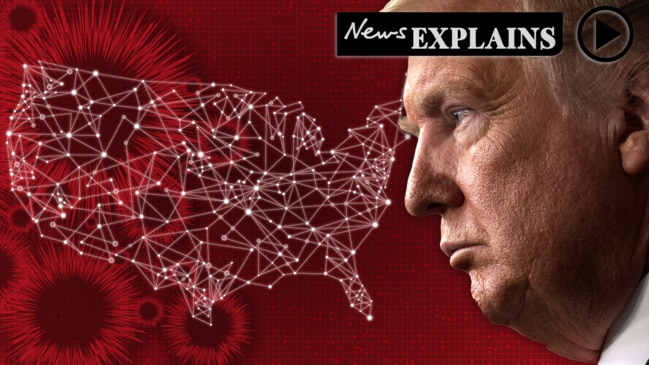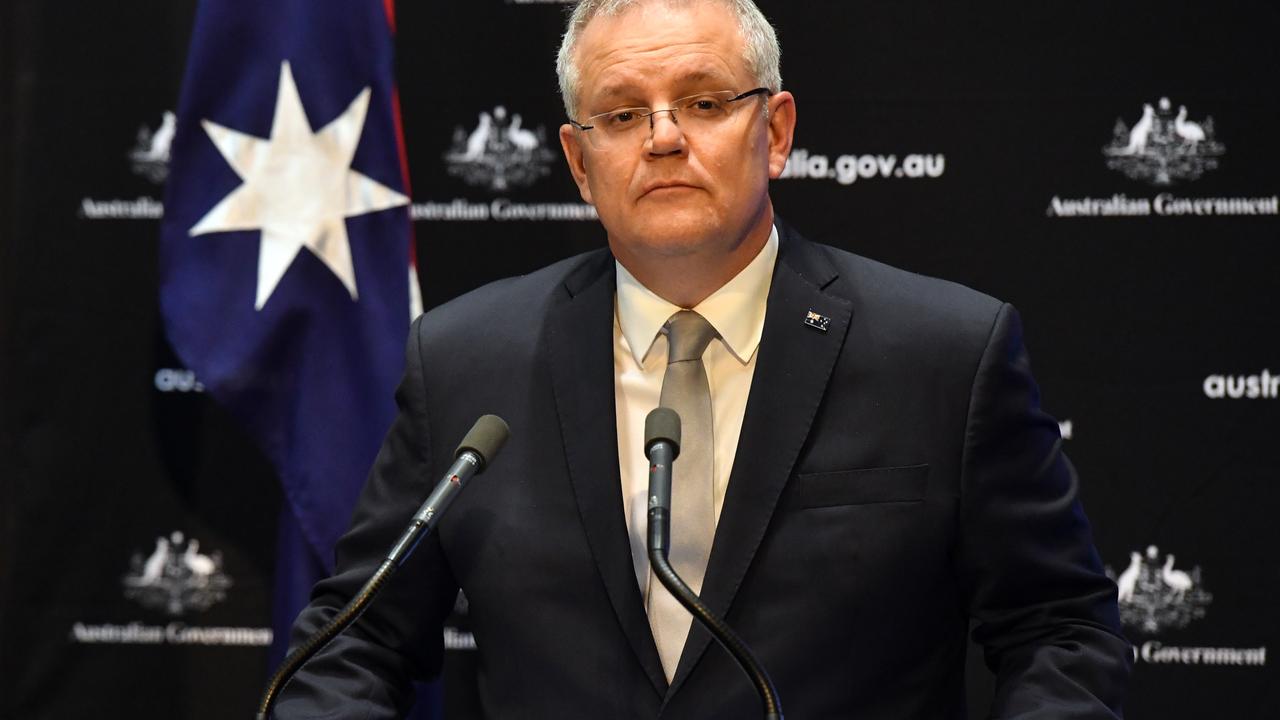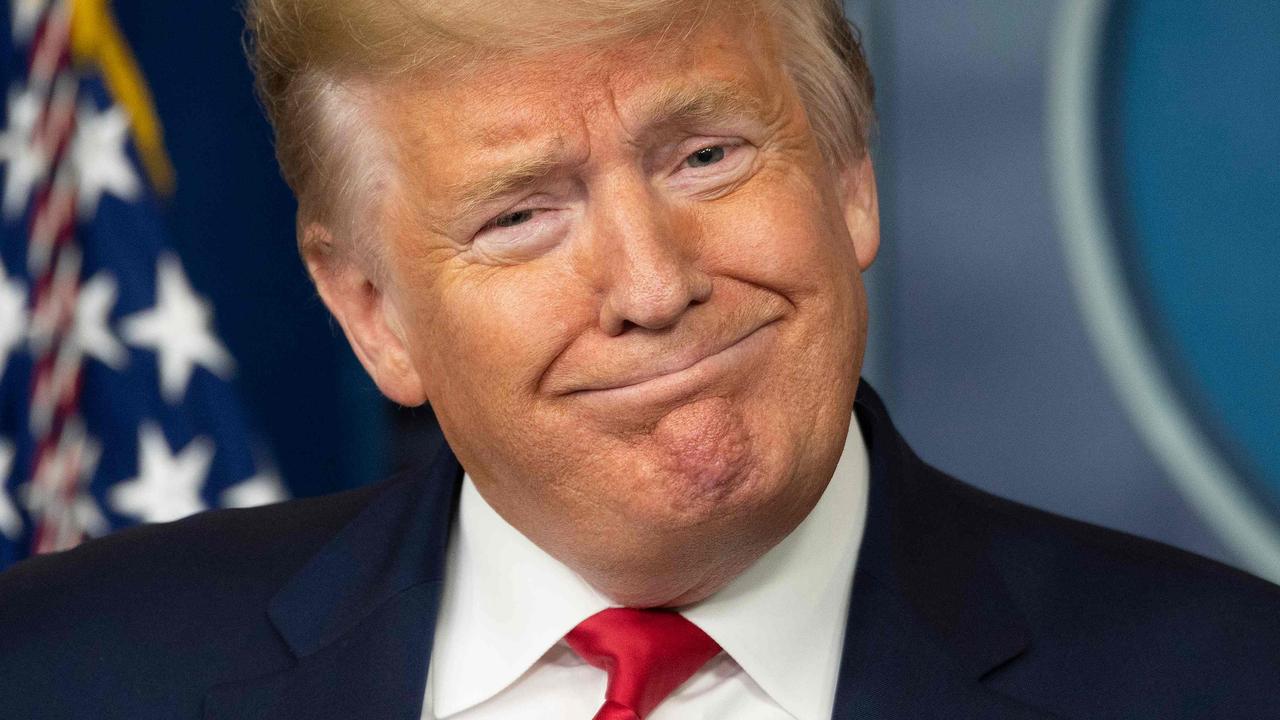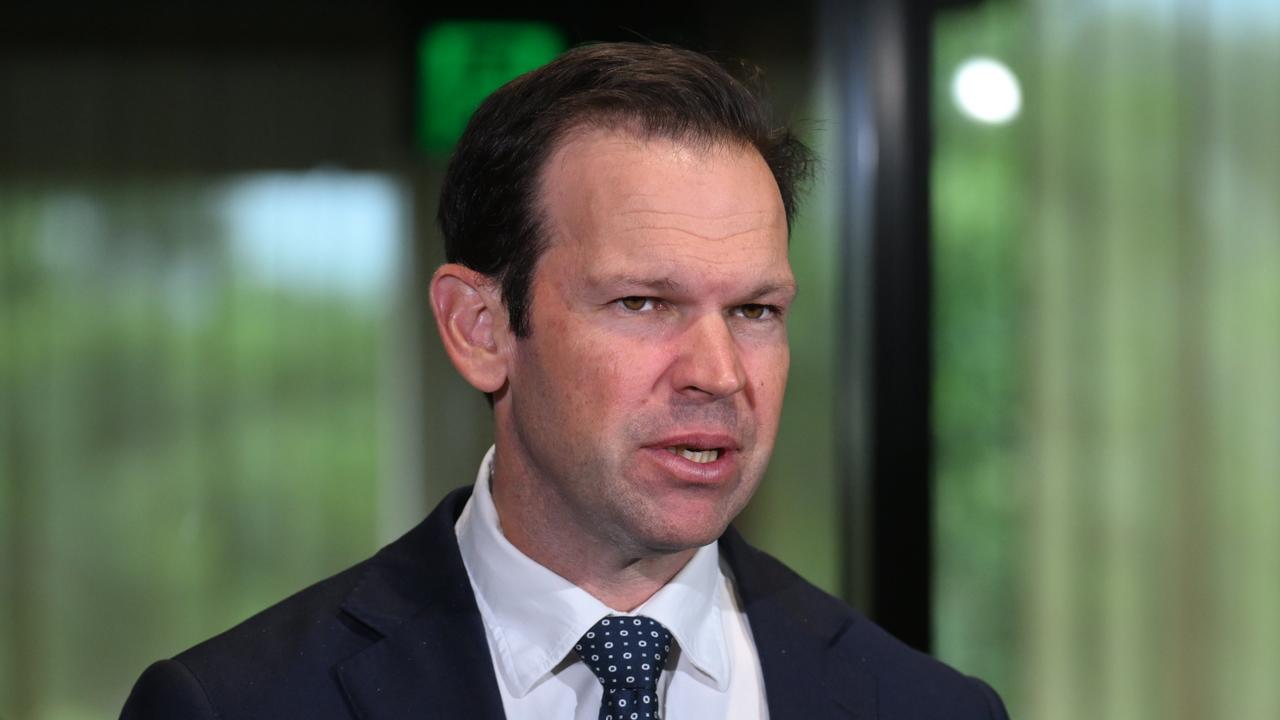Coronavirus US: President Donald Trump is weirdly fixated on the wrong number
As the US struggles with the worst coronavirus outbreak in the world, Donald Trump is utterly fixated on a number that doesn’t matter.

COMMENT
Prime Minister Scott Morrison has spent much of the last fortnight focusing on one crucial coronavirus statistic.
Whenever he stands in front of the cameras, Mr Morrison points out that the virus’s rate of growth in Australia is falling. Pretty much every day, we are reporting fewer new cases than the day before.
“It has occurred well beyond our expectations in the way that we’ve been able to bring that daily growth rate down together, and certainly ahead of what all the theoretical models would have expected,” he said at one press conference.
This is a crucial sign that the curve is flattening, and that the government’s social distancing policies are working.
RELATED: How Australia achieved remarkable virus stat
RELATED: Follow all the latest coronavirus updates
Mr Morrison isn’t just bragging about his government’s success. There is a very real point to his fixation on the growth rate – he is trying to convince Australians, in the simplest terms possible, that the rules are making a difference and we have to keep following them.
Any slip-up, he says, could “completely undo everything” we have achieved so far.
RELATED: PM warns one lapse could ‘undo everything’ Australia has achieved
What I’m saying here is that he is focused on the right number for the right reasons.

In the United States, meanwhile, President Donald Trump is obsessed with the wrong number, for reasons entirely beyond comprehension.
America is in the midst of the worst coronavirus outbreak in the world. At the time of writing, it had reported 468,000 confirmed cases – more than three times as many as Spain in second place. The state of New York alone has more cases than any other country on earth.
Meanwhile the American death toll, at 16,700 and rising fast, has jumped by almost 2000 people a day for three days in a row.
By any measure, the US is in deep, deep trouble. And yet Mr Trump seems more interested – I kid you not – in his TV ratings.
This week The Wall Street Journal wrote an editorial mildly criticising the President’s daily coronavirus briefings, saying they had become “less about defeating the virus and more about the many feuds of Donald Trump”.
It said the President’s frequent “outbursts” against reporters, state governors and critics were “notably off key”, given the briefings supposedly exist solely to relay important information to the public.
Mr Trump responded, as is his wont, by labelling the Journal “fake news”. He ignored the substance of its critique and instead, in a bewildering non sequitur, accused it of “forgetting” to mention his briefings’ high TV ratings.
The Wall Street Journal always “forgets†to mention that the ratings for the White House Press Briefings are “through the roof†(Monday Night Football, Bachelor Finale, according to @nytimes) & is only way for me to escape the Fake News & get my views across. WSJ is Fake News!
— Donald J. Trump (@realDonaldTrump) April 9, 2020
Over the last few years, we have all become increasingly desensitised to Mr Trump’s many peculiarities, to the point where we barely notice some of his more outlandish pronouncements anymore. But I really cannot emphasise enough how bizarre that reply is.
It’s the equivalent of George W. Bush bragging about how many people watched his speech after the 9/11 terrorist attacks, or Barack Obama revelling in his viewership after announcing the death of Osama bin Laden.
And it’s not even the first time Mr Trump has done it. This fixation on ratings goes all the way back to a media conference at the start of March, when Mr Trump was asked which measures he was considering to offset the economic cost of the pandemic.
He responded by quizzing a Fox news reporter on his ratings from a televised town hall the day before.
“How was the show last night, did it get good ratings?” Mr Trump asked.
“I don’t know,” said the reporter, who had not thought to look up this apparently critical information beforehand.
“Oh really, I heard it broke all ratings records,” said the President. He never got around to answering the question.
A few weeks later, The New York Times wrote a story which mentioned the many millions of people tuning in to Mr Trump’s briefings.
The point of the piece was to wonder whether TV networks should continue to show the briefings live, given concerns about the President repeatedly spouting misinformation to the audience.
He ignored those parts of the article, and selectively tweeted out excerpts comparing his ratings to those of Monday Night Football and The Bachelor.
Because the “Ratings†of my News Conferences etc. are so high, “Bachelor finale, Monday Night Football type numbers†according to the @nytimes, the Lamestream Media is going CRAZY. “Trump is reaching too many people, we must stop him.†said one lunatic. See you at 5:00 P.M.!
— Donald J. Trump (@realDonaldTrump) March 29, 2020
It seems Mr Trump was a big fan of the comparison.
“These are like Monday Night Football ratings, and these are like Bachelor finale,” he bragged during a coronavirus briefing on March 29.
“That’s their end,” he stressed, in case people didn’t realise what the word finale meant. “When the big deal happened – I have no idea what happened because I’m too busy working on this. Some day you will tell me what happened.”
For the record, the show ended with Bachelor Peter Weber proposing to one contestant, then dumping her to pursue the runner-up. Farcical.
In that sense, it was rather like America’s response to the virus, which has involved severe testing shortages, months of the President downplaying the threat, states competing with each other for overpriced medical equipment, and generally all sorts of bad things that could have been avoided by a more competent federal government.
RELATED: Why the United States is on the brink of catastrophe

Anyway, back to this week. I was particularly struck by Mr Trump’s choice of words in his tweet slapping down the Journal. He said the paper “forgot” about his TV ratings, as though mentioning those ratings is the sort of thing a normal person would usually think to do.
In reality, nobody talks about the ratings because they are not the slightest bit relevant.
Do you know how many people watch Scott Morrison’s coronavirus press conferences? Have you ever even wondered? Of course not, because there are a million more important things to focus on.
You would think, as the man responsible for ensuring as few Americans as possible die from the virus, Mr Trump would also have more important things to worry about.
I never thought I’d find myself quoting a nugget of wisdom from Howard Stern but he actually summed up the situation pretty well after one of the President’s more braggadocios monologues.
“Do I pull my hair out of my head when I see my buddy Donald Trump standing there talking about how can people not look at his ratings, and his ratings are higher than The Bachelor?” the radio host said.
“The reason his ratings are higher is because people are scared s***less.
“It’s not your incredible reality TV show that you’re putting on for the country.
“It’s because we’re in crisis and we’re tuning in to see what the President has to say. We’re looking for leadership.”
That is the key point Mr Trump doesn’t seem to understand. He thinks the TV ratings are a sign of his own popularity, as though he’s still hosting The Apprentice, when in fact they are a sign that people are scared for themselves and their loved ones, and want more information.
A couple of weeks ago, when the death toll in the US was still a relatively modest 200, Mr Trump was specifically asked what he would say to those Americans who were “scared s***less”, as Stern put it.
Any other leader would have replied with something empathetic and reassuring. Indeed Vice President Mike Pence did just that when he fielded the same softball question later that day. Mr Trump, for some unknowable reason, went ballistic.
“I say that you are a terrible reporter. That’s what I say,” said Mr Trump.
“I think it’s a very nasty question. I think it’s a very bad signal that you are putting out to the American people.
“That’s really bad reporting. And you ought to get back to reporting instead of sensationalism.”
That is exactly the sort of exchange the Journal was talking about. Mr Trump too often gets consumed by petty personal grievances when he should be focused on doing his job.
That can be an amusing sideshow in normal times, when there isn’t a heck of a lot to worry about. During a crisis, it reveals some seriously warped priorities.
A fortnight ago I wrote a piece comparing Scott Morrison, quite unfavourably, to New Zealand Prime Minister Jacinda Ardern. Yes, I realise that is insufferably self-referential, but bear with me.
The central point was that few people care about politics during a crisis. They just want their national leader to be a clear, coherent source of critical information.
Ms Ardern wins so many plaudits for her crisis leadership because she ditches all the political nonsense and self-justification, and essentially becomes a public information service.
RELATED: The quality that makes Jacinda Ardern is so effective in a crisis
Mr Morrison has proven me wrong since that article. He has at last offered the sort of clarity Australians needed, and now we’re in an enviable situation by global standards.
Mr Trump, on the other hand, still hasn’t grasped what crisis leadership is about. It’s about simple, sober competence. It’s about being straight with people and giving them facts, not empty bluster. It’s about leaving your ego aside and doing whatever is best for your constituents, whether you think it’s good for your short term popularity or not.
Your approval rating is irrelevant. Your TV viewership is irrelevant. The only number that matters is the death toll, and what you can do to limit it.
Mr Trump, it seems, is incapable of being that kind of leader.




